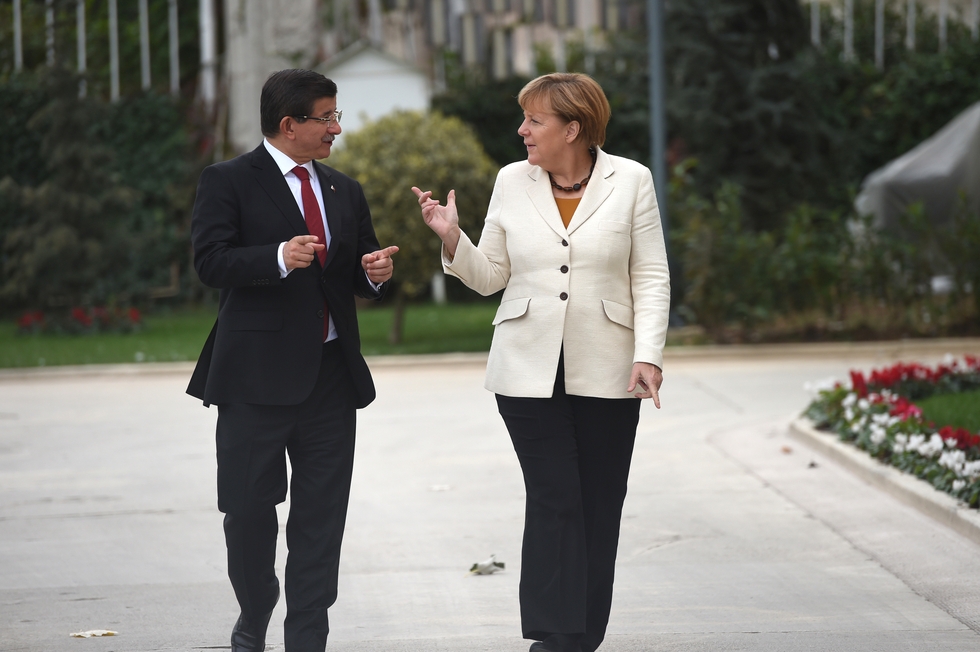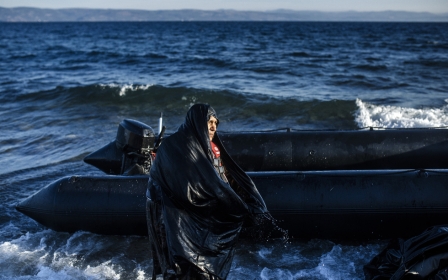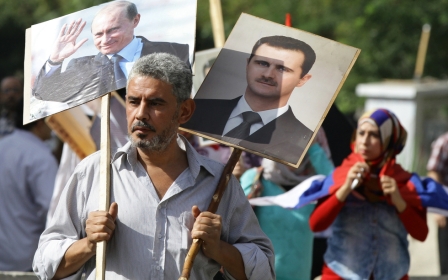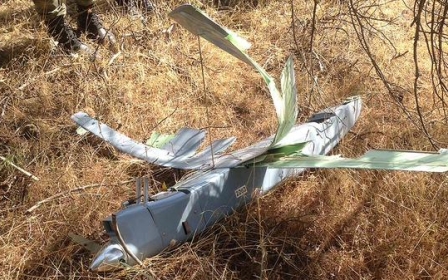Merkel in Turkey to discuss refugee crisis
Turkey wants greater recognition for the role in accepting high numbers of refugees

German Chancellor Angela Merkel speaks to Turkish Prime Minister Ahmet Davutoglu (AFP)
Published date: 18 October 2015 14:39 BST
|
Last update: 9 years 1 month ago
German Chancellor Angela Merkel was on Sunday holding talks with Turkish leaders over ways to resolve the refugee crisis after Turkey expressed disappointment with the EU's efforts so far.
Merkel was meeting Prime Minister Ahmet Davutoglu at the Ottoman-era Dolmabahce Palace in Istanbul ahead of talks with President Recep Tayyip Erdogan on a critical one-day visit which was only announced on 12 October.
With no end in sight to the crisis which has posed the biggest challenge of Merkel's career, the flood of migrants and refugees continued to make their way across Europe, pouring into Slovenia after Hungary closed off its border with Croatia.
The European Union wants Turkey to do more to tighten its border security and help contain the historic influx of people from Syria, Iraq and other conflict zones seeking shelter in the 28-nation bloc.
In return, Ankara wants greater recognition for its role in hosting over two million Syrian refugees, a concrete increase in financial help and for an acceleration of its long-stalled bid for EU membership.
Germany has been Europe's top destination for refugees, most of whom travel through Turkey and the Balkans, and is expecting to register up to a million asylum requests this year -- a development which has hurt Merkel politically.
But Erdogan has heaped scorn on Europe's efforts to deal with the crisis and urged Brussels to take Ankara's EU membership bid more seriously.
"We are hosting 2.5 million refugees but nobody cares," he said.
And Turkish Foreign Minister Feridun Sinirlioglu punctured hopes that a deal had been reached between Ankara and Brussels, saying an action plan thrashed out on Thursday was only a draft and the financial help offered was "unacceptable".
With Turkey facing one of the most significant junctures in its modern history, Merkel is also expected to discuss security a week after a double suicide bombing killed more than 100 people, and as the country's heads towards parliamentary elections on 1 November.
'Hopes not running high'
Research institute the European Stability Initiative said although expectations were "not running high" for Sunday's talks, Berlin and Ankara "share a capacity to bring the migration crisis back under control".
"If Germany and Turkey cannot reach a deal, there are no other solutions in sight, and the mass migration of Syrians and others into the EU will continue."
More than 630,000 people fleeing war and misery in the Middle East and Africa have landed on Europe's shores this year, many making risky sea crossings from Turkey to Greece.
Another 12 people drowned off the Turkish coast on Saturday, and on Sunday the Greek coastguard said five migrants including a baby and two boys had died trying to cross the Aegean Sea.
Of those who make it, most try to get to Germany, after Merkel made clear her country would take in people fleeing the bloody Syrian war.
While many Germans have welcomed the refugees, there has also been a backlash. Support for Merkel's conservatives has dipped another point to 37 percent, a new poll said on Sunday.
Simmering tensions ended in violence in the western city of Cologne on Saturday when a man with a knife attacked the independent mayoral hopeful Henriette Reker, who is active in helping refugees, leaving her with serious neck wounds, and injuring four others.
Police arrested the attacker who told them he had "a racist motivation" for the assault, which regional police chief Wolfgang Albers described as a "political act". Investigators however said they could not rule out that the man was psychologically disturbed.
Influx into Slovenia
As the influx continued, Hungary closed its border with Croatia, forcing the migrants to find a new more westerly route to northern Europe through Slovenia and into Austria.
Croatia on Saturday began ferrying migrants by bus and train to its northern border with Slovenia, with 3,000 crossing the frontier. Hundreds more were arriving in Slovenia on Sunday aboard a special train from Croatia.
Slovenia has said it would draft in the army to help police cope with the additional numbers.
Another 1,000 people crossed from Slovenia into Austria on Saturday and through the night, police said, with most headed for Germany, where debate continued over how to slow the influx.
Police union chief Rainer Wendt told the Welt am Sonntag newspaper Germany should build a fence along its border with Austria.
"If we close our borders this way, Austria will also close its border with Slovenia, and that's exactly the effect we need," he said, insisting that Germany could no longer send out the message that everyone was welcome.
New MEE newsletter: Jerusalem Dispatch
Sign up to get the latest insights and analysis on Israel-Palestine, alongside Turkey Unpacked and other MEE newsletters
Middle East Eye delivers independent and unrivalled coverage and analysis of the Middle East, North Africa and beyond. To learn more about republishing this content and the associated fees, please fill out this form. More about MEE can be found here.




